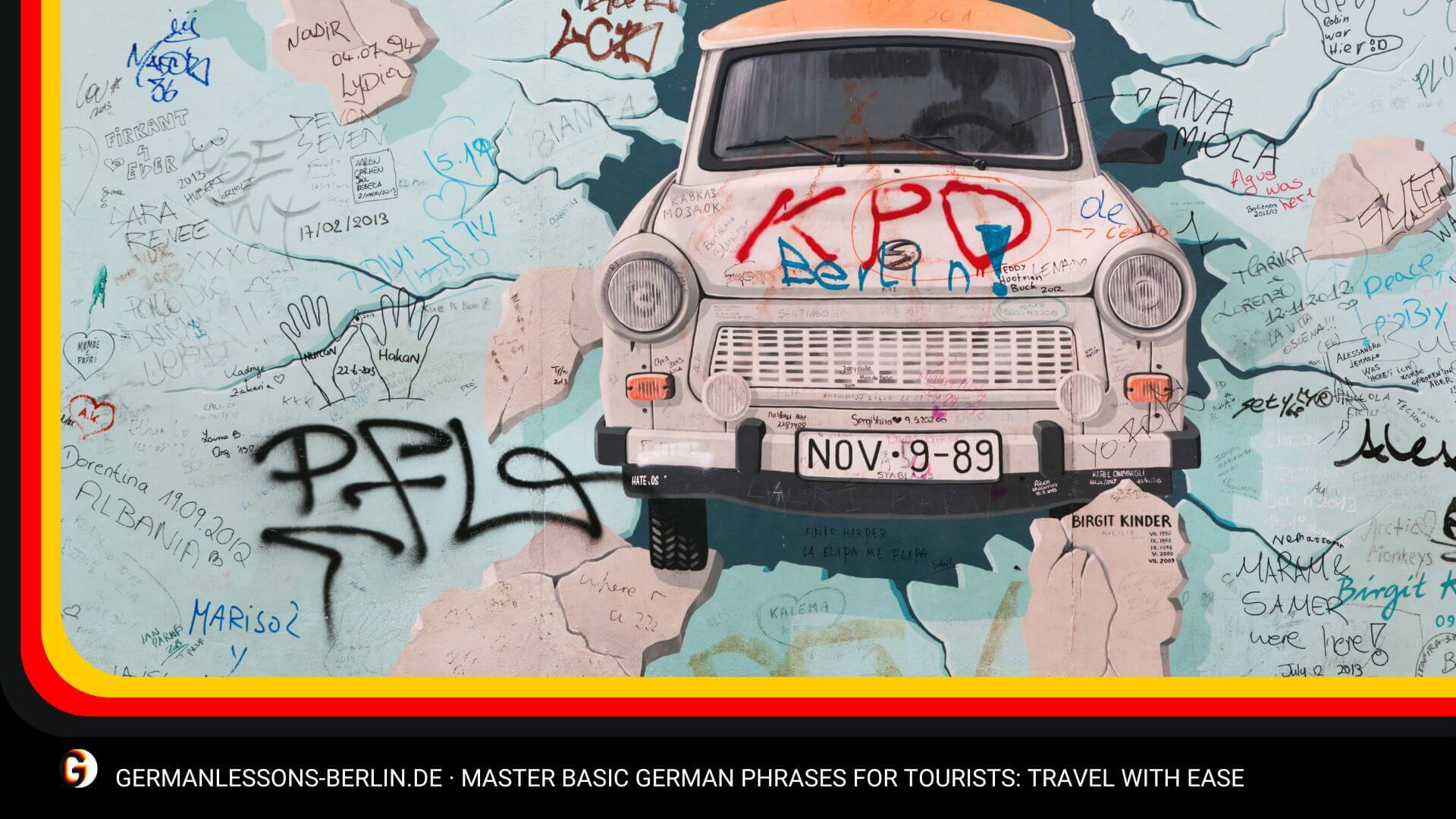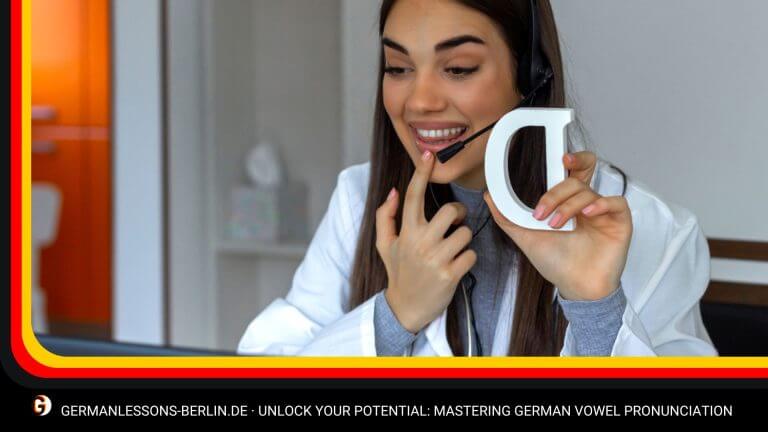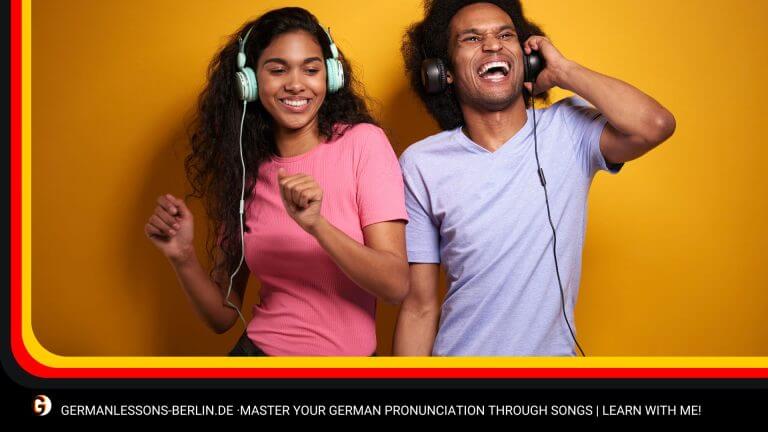Table of Contents
Embarking on a journey to Germany is always thrilling, and as I pack my bags, my anticipation grows. However, there’s one essential item that doesn’t take up any space yet proves invaluable—knowledge of basic German phrases for tourists. Learning German for travel is a critical step that I always prioritize to not only navigate through the winding streets and lively bazaars but also to connect with the culture and people on a deeper level. A well-rounded German travel guide equipped with essential German phrases can transform your trip from a mere sightseeing tour to an immersive experience. Whether it’s asking for directions, ordering a hearty meal, or simply exchanging pleasantries, every interaction becomes more meaningful with a touch of the local language.
My secret to smooth travels lies in the convenience of technology—I keep handy apps and a digital phrasebook right at my fingertips. This modern approach allows me to travel light yet be prepared for any situation. Walking through the streets of Berlin or enjoying the scenic beauty of Bavaria, I’m always ready to use my German phrases confidently, enhancing every moment of my stay.
I’ve found that a few words can open a world of difference, creating smiles and opening doors that would otherwise remain closed. Let me share my must-have German phrases that are sure to make your next trip to Germany as authentic and enjoyable as it deserves to be.
Key Takeaways
- Grasping basic German phrases enriches your travel experience in Germany.
- Having a German travel guide or app can be tremendously helpful for on-the-go language assistance.
- Learning German phrases for tourists can lead to smoother interactions and convey respect for the local culture.
- Essential German phrases should be at the top of your list when preparing for a trip to Germany.
- Technological tools like language apps can help you quickly find and use the German phrases you need.
- Even simple, polite phrases in German can create goodwill and enhance your overall travel experience.
The Importance of Learning Basic German Phrases for Travel
As I reflect on my travels, I can’t help but emphasize the benefits of learning German before embarking on a journey to Germany. Not merely a collection of sounds, the German language for travel becomes a powerful tool opening up the treasures of culture and interaction. Many a time, my modest grasp of German phrases has smoothed the path through various scenarios, enabling me to absorb the essence of local life far beyond what typical German for tourists experiences might offer.
In smaller towns and the countryside, not everyone speaks English, which is why communicating in German can be crucial. There is an authentic delight in ordering a Kaffee und Kuchen with the correct German pronunciation, or expressing my gratitude with a heartfelt “Danke schön,” feeling reassured that I can interact with locals in their own tongue. And let’s not forget the practical side—knowing German phrases can deter potential misunderstandings and overpricing often faced by tourists.
Practically, each interaction enhanced by German knowledge is a step towards a richer experience. Be it asking for directions or discussing a menu, it removes barriers, showing profound respect for the country’s customs and its people’s way of life.
Every new language is like an open window that shows a new view of the world and expands your attitude towards life. — Frank Harris
Moreover, the fidelity of my own adventures amplifies when I bypass the linguistic limitations. Picture the scenario: a local inviting me to a hidden gem of a café that only the natives know about, all because I asked a simple question in their language. These serendipitous joys of travel are the ones I cherish most, and they usually start with a mere “Sprechen Sie Englisch?” transitioning into an exchange in German.
Consider the following table that succinctly encapsulates the advantages of having a German phrasebook handy:
| Benefits of Speaking German | Experience Without German |
|---|---|
| Richer cultural experiences | Surface-level tourism |
| Deeper interactions with locals | Limited communication |
| Independence in travel | Reliance on English-speakers |
| Preventing misunderstandings | Potential for tourist traps |
| Enjoyment of local cuisine with proper orderings | Sticking to safe, familiar dishes |
To wrap up this section, I urge you to consider the undeniable value in dedicating time to learn basic German phrases. Doing so not only enhances the quality of your travel experience but also ingrains memories with a distinct hue of authenticity—a testament to the infinite rewards of learning and engaging with a new language.
Essential Greetings and Polite Expressions in German
Whenever I set foot in Germany, I start with the basics: Basic German Greetings. These are simple yet powerful when Saying Hello in German. I begin my day with a cheery “Guten Morgen,” and throughout the day, I greet with “Hallo” or “Guten Tag,” and as dusk falls, “Guten Abend” naturally takes its place. I’ve observed that these greetings not only open doors but also hearts, blending me into the rhythm of local life.
Farewells are equally important, and knowing the right German Goodbyes helps me part on good terms. A casual “Tschüss” works with newfound friends, while “Auf Wiedersehen” carries a formal note, signaling respect and the hope for future meetings.
How to Say Hello and Goodbye
As I journey through different regions of Germany, I adapt my greetings to fit the setting. A handshake accompanying a formal “Guten Tag” in a business meeting, a warm “Hallo” at a cozy street café, and a polite nod with “Guten Abend” in a classy restaurant. A wave and a bright “Tschüss” has become my signature move when leaving gatherings or casual encounters.
Formal vs Informal Introductions
When I first meet someone, selecting between Formal German Introductions and Informal German Greetings is crucial. A formal “Mein Name ist…” during introductions at a conference gives a professional tone. In contrast, a relaxed environment calls for a friendly “Ich heiße…” as I intermingle with the locals. Grasping the subtle use of “Sie” as opposed to “du,” depending on whom I’m addressing, mirrors my respect for German Politeness.
Expressing Gratitude and Courtesy
| German Phrase | Meaning | Use Case |
|---|---|---|
| Bitte | Please/You’re welcome | Asking for a favor or responding to a thank you |
| Danke | Thank you | Expressing gratitude after receiving a service |
| Vielen Dank! | Thank you very much! | Showing deep appreciation |
Whether I’m asking for help or receiving service, phrases like “Bitte” and “Danke” become my everyday companions. These words, simple yet profound, reflect my gratitude and ensure pleasant exchanges. I’ve experienced firsthand that a sincere “Danke” or “Vielen Dank!” can light up faces with smiles, turning mundane transactions into moments of connection.
My travels have taught me that knowing Courtesy Phrases in German is an unspoken language of respect. It enhances my explorations, making each “Danke” a note in the symphony of German culture—elevating simple gestures into memorable exchanges.
Every new language is like an open window that shows a new view of the world and expands your attitude towards life. — Frank Harris
Integrating these expressions of respect and gratitude into my daily interactions truly magnifies my travel experiences. The beauty of communication unfolds in the heart of Germany, where a “Bitte” can open doors and a “Danke” can build bridges.
- Introducing Yourself in German determines the tone of your conversations.
- Bridging language gaps with German Expression of Thanks and Polite German Expressions.
- Every “Bitte” and “Danke” weaves you into the social fabric with German Politeness.
German Phrases for Navigating Dining and Restaurants
There’s something about walking into a German restaurant and seamlessly slipping into the local dining culture that makes any meal an event to remember. Utilizing essential German Dining Phrases not only impresses the staff but it also enhances my overall dining experience. Armed with a foundation of German Restaurant Vocabulary, I find myself navigating menus and ordering with a confidence that only comes from preparation.
When in Germany, speak as the Germans do.
Upon arrival at a new eatery, I often begin with a polite, “Einen Tisch für zwei, bitte,” securing a cozy spot for my companion and me. Knowing how to Order Food in German is a satisfying skill, particularly when I’m craving specific local delicacies. “Ich hätte gern die Bratwurst mit Sauerkraut,” I’d say, my request met with an approving nod from the server—a subtle sign of a culinary adventure done right.
It’s crucial to know key terms like “Frühstück,” “Mittagessen,” and “Abendessen” to let the staff know which meal I’m there for. And when the meal concludes, I smoothly transition to settling the bill with a “Die Rechnung, bitte,” ensuring no awkward lapses while waiting for the check.
| German Phrase | English Translation | Context of Use |
|---|---|---|
| Kann ich bitte die Speisekarte sehen? | Can I see the menu, please? | Requesting the menu to peruse meal options |
| Ich hätte gern… | I would like to have… | Ordering a specific dish or item |
| Könnte ich ein Glas Wasser haben? | Could I have a glass of water? | Asking for a common beverage |
| Ein Bier, bitte. | A beer, please. | Ordering a popular German drink |
| Zum Wohl! | Cheers! | Making a toast before drinking |
Exploring German Menu Phrases also means knowing how to respectfully address dietary concerns. Queries like “Ist das glutenfrei?” or “Haben Sie vegetarische Optionen?” become invaluable. It’s also common to see me raise my glass with a joyful “Prost!” as I savor local beers alongside fellow diners, united in the universal language of good cheer.
No matter where I dine in Germany, from a homely inn in Bavaria to a bustling brasserie in Berlin, I approach each meal with a set of phrases that guarantee a smooth and enjoyable dining experience. Here’s a parting tip: always remember to thank your server with a heartfelt “Danke” or “Vielen Dank” as you leave—it’s the polite gesture that often earns me a warm invitation to return.
- German Dining Phrases are your passport to a smoother restaurant visit.
- Ordering Food in German situates you as a considerate and cultured traveler.
- Command of the German Restaurant Vocabulary is key to enjoying Germany’s culinary variety.
Key Phrases for Shopping in Germany
Whenever I immerse myself in the delightful experience of shopping in Germany, I make sure to arm myself with essential German Shopping Vocabulary. Navigating through the vibrant markets and boutique stores becomes much more fluid when I can confidently express myself with phrases like “Wie viel kostet das?” (How much does this cost?) and “Haben Sie das in einer anderen Größe?” (Do you have this in another size?). Effortlessly Asking Prices in German and inquiring about German Clothing Sizes makes the hunt for the perfect item not just successful, but also exciting.
Asking for Prices and Sizes
When I spot an item that catches my eye, my immediate step is to understand its affordability and fit. Here are some phrases that have become invaluable during my shopping adventures:
- “Entschuldigung, können Sie mir helfen?” (Excuse me, can you help me?)
- “Wie viel kostet das?” (How much does this cost?)
- “Ist das der Endpreis?” (Is that the final price?) – useful when Negotiating Prices in German.
- “Haben Sie das in einer kleineren/größeren Größe?” (Do you have this in a smaller/larger size?)
- “Könnte ich das anprobieren?” (May I try this on?)
Understanding Sales and Discounts
My pulse quickens with the thrill of getting a good deal, especially when I’m wise to the German Sales Phrases and familiar with Discounts in German. During seasonal German Shopping Deals, I navigate the crowded shops with phrases like:
- “Gibt es einen Rabatt auf diesen Artikel?” (Is there a discount on this item?)
- “Ist dies im Angebot?” (Is this on sale?)
- “Wann beginnt der Ausverkauf?” (When does the sale start?) – a prime question during shopping festivals.
Handling Payments and Transactions
To round off a successful shopping excursion, handling Payments and Transactions in German is key. Whether it’s a quaint bookshop in Berlin or a bustling flea market in Munich, knowing how to conclude a transaction eases the process:
- “Kann ich mit Kreditkarte zahlen?” (Can I pay with a credit card?)
- “Ich zahle bar.” (I am paying cash.)
- “Kann ich die Quittung haben, bitte?” (May I have the receipt, please?)
Checkouts in Germany are as unique as every purchase, but knowing the German Checkout Vocabulary makes Making Payments in German a breeze. I find this interaction marks the end of a satisfying buying journey and the beginning of many cherished stories to tell.
Shopping internationally is as much about the finds as it is about the experience and connection. Speaking the local retail language is your gateway to becoming an insider.
| Phrase | Usage |
|---|---|
| “Entschuldigung, wo ist die Kasse?” | Asking for the location of the checkout |
| “Könnte ich bitte eine Tüte bekommen?” | Requesting a shopping bag |
| “Haben Sie dieses Produkt auch in anderen Farben?” | Inquiring about color options |
In my meanderings through Germany’s retail landscape, I’ve learned that each phrase holds the power to unlock a smoother, more delightful shopping sojourn, while German Payment Phrases sign off each adventure on a note of understanding and mutual respect.
Essential German Travel Phrases for Transportation and Directions
My experiences have taught me the incredible value of being equipped with German Phrases for Transportation when I travel through Germany. Learning to say “Wo ist der Bahnhof?” has often led me to the correct platform and onto my next adventure with ease. The punctuality and efficiency of Public Transport in Germany are unmatched, making it crucial to know how to navigate these systems.
As I found myself exploring various cities, I often relied on German Direction Vocabulary to orient myself. Whether looking for landmarks or trying to get back to my hotel, a simple “Entschuldigung, wo ist…?” has opened up pathways and helpful interactions with locals. It’s clear that Navigating in German is not just about moving from point A to B, but also about connecting with the country in a unique way.
Understanding the local way of asking for directions is like being handed a key to the city. It transforms you from a spectator to a participant in the daily dance of German life.
With the right phrases, I could traverse Germany’s extensive public transportation network or find my way in a bustling city. To assist fellow travelers, I’ve compiled a table of essential phrases, which includes compass directions that I’ve found indispensable for Navigating in German.
| German Phrase | English Translation | When to Use |
|---|---|---|
| Wo ist der Bahnhof? | Where is the train station? | To find the nearest train station for regional or long-distance travel. |
| Zum Flughafen, bitte. | To the airport, please. | When communicating with a taxi or bus driver about your destination. |
| Entschuldigung, wo ist…? | Excuse me, where is…? | Seeking directions to a specific location. |
| Wie komme ich zu…? | How do I get to…? | Looking for detailed directions to a place. |
| Ist es weit von hier? | Is it far from here? | Assessing the distance to your destination. |
| Nach Norden/Süden/Osten/Westen. | To the North/South/East/West. | Using compass directions to navigate. |
Moreover, the use of these German Phrases for Transportation has consistently proven to be more than just functional; they became a bridge to respectful and pleasant interactions. As I learned to ask, “Kann ich bitte eine Fahrkarte kaufen?” I not only obtained my ticket but also often received helpful insider tips on local spots to visit.
- Mastery of basic direction terms like Nord (North), Süd (South), Ost (East), and West (West) can make all the difference in finding your way around.
- Asking “Fährt dieser Bus/Zug nach…?” connects you to the right transport service in a busy station.
- Having compassion for yourself as you navigate a new language and transportation system is key. Everyone starts somewhere, and Germans are often eager to help if you’re willing to ask.
Each phrase, each interaction, each journey on a bus, train, or tram, imprints upon my memory a rich tapestry of the German landscape—both urban and pastoral. So, before you set out on your journey, take some time to acquaint yourself with these phrases—they could be your best travel companion in Germany.
Navigating Accommodations: Useful German for Hotel Stays
During my travels in Germany, I’ve realized how essential it is to be fluent in specific German Hotel Phrases that facilitate a smooth interaction from check-in to check-out. Securing and navigating accommodations can be a breeze when I confidently use phrases like “Wir haben eine Reservierung” (We have a reservation), immediately signaling to the staff that I am well-prepared and informed.
When I arrive at the hotel, sometimes earlier than expected, I approach the front desk with the query “Haben Sie noch freie Zimmer?” (Do you have free rooms available?). This question comes in handy when my plans have changed last minute and I require an immediate Hotel Stay in Germany.
One of the aspects of accommodations I’m always careful about is the cost. Inquiring “Wie viel kostet ein Zimmer pro Nacht?” (How much is a room per night?) ensures that I’m in the know financially and can budget accordingly for the rest of my travels.
For a hassle-free experience Booking Rooms in German, I regularly use the following phrases which cover various aspects of a hotel stay. Take note of these essential inquiries and statements that could make your accommodation experience in Germany as comfortable as it can be:
| German Phrase | English Translation | When to Use |
|---|---|---|
| Ich habe ein Zimmer reserviert | I have a room reserved | Upon arrival, to confirm your booking |
| Das Frühstück ist inklusive? | Is breakfast included? | To learn if your stay includes breakfast |
| Um wie viel Uhr ist der Check-in/Check-out? | What time is check-in/check-out? | To plan your arrival and departure accordingly |
| Ich hätte gerne ein Zimmer mit Aussicht | I would like a room with a view | When you have specific room preferences |
| Gibt es WLAN im Zimmer? | Is there Wi-Fi in the room? | To ensure internet connectivity during your stay |
I find that clear communication using the proper German Accommodations Language can influence the quality of my hotel experiences. Whether it’s about comfort, cost, or convenience, being able to articulate your accommodation needs in German is valuable.
“Staying at a hotel should be a pleasant experience, and speaking the local language enhances that comfort manifold.”
And, of course, it’s not just about asking questions. Expressing satisfaction with phrases like “Das Zimmer ist sehr gemütlich” (The room is very cozy) or addressing concerns with “Der Fernseher funktioniert nicht” (The TV is not working) helps maintain a good guest-host relationship during your Hotel Stay in Germany.
- Before you travel, revising essential German Hotel Phrases equips you for a better stay.
- Courteously addressing staff with the correct German Accommodations Language showcases respect for their profession and culture.
- Knowing efficient phrases to Booking Rooms in German saves time and aids in a smoother travel experience.
Lastly, while I always strive to perfect my pronunciation and usage of these phrases, I’ve noticed that hotel staff are generally supportive and patient as one navigates the learning curve of a new language. It’s the effort that counts, and it always pays off in warm smiles and excellent service.
Emergency and Health-Related German Phrases for Tourists
When it comes to travel, we often envision beautiful landscapes and smooth sailing. Yet, the unexpected can occur, and knowing how to handle emergencies in a foreign country is pivotal. My travels have taught me the significance of equipping myself with a range of German Health Phrases and vocabulary to adequately deal with such situations. Understanding the basics of Medical Assistance in German not only grants peace of mind but also ensures that critical help can be accessed when needed.
Seeking Medical Help
Should a health emergency strike, expressing your needs quickly and accurately can be lifesaving. Whether it’s a minor ailment or a serious condition, familiarizing yourself with Emergency German Vocabulary like “Ich brauche einen Arzt” (I need a doctor) or “Ich fühle mich nicht gut” (I don’t feel well) provides clarity to healthcare professionals. Moreover, asking “Wo ist das Krankenhaus?” (Where is the hospital?) can direct you to the nearest medical facility equipped to handle your German for Health Emergencies.
| German Phrase | English Translation | Context of Use |
|---|---|---|
| Ich brauche einen Arzt | I need a doctor | When requiring immediate medical attention |
| Wo ist das Krankenhaus? | Where is the hospital? | In search of emergency medical care |
| Ich fühle mich nicht gut | I don’t feel well | Describing a general state of unwellness |
Reporting Lost or Stolen Items
Encountering theft or losing personal belongings can be distressing, particularly in a non-English speaking country. In Germany, articulating incidents with precise German Phrases for Lost Items and phrases for Reporting Theft in German can expedite the process of recovery. Statements like “Meine Tasche wurde gestohlen” (My bag was stolen) or “Ich habe meinen Pass verloren” (I have lost my passport) are critical when German for Reporting Incidents to local authorities.
Lost or stolen possessions are more than mere inconveniences; they are disruptions that require swift and clear communication.
Dealing with Unforeseen Circumstances
No travel itinerary can anticipate every scenario. Thus, being prepared for Unexpected Situations in German is essential. Phrases such as “Das war nicht geplant” (That was not planned) express the element of surprise and need for assistance in situations that deviate from the expected course. In the event of an accident, “Wir haben einen Unfall gehabt” (We had an accident) conveys the gravity of the situation. When immediate assistance is needed, “Können Sie helfen?” (Can you help?) is a vital request that can be extended to those around you.
- Acquiring German Phrases for Unforeseen Events can significantly reduce stress.
- Effective communication during Dealing with Issues in Germany builds connections with locals who can help.
- Carry a pocket guide with German Problem Phrases to handle hiccups along the way.
Voyages are filled with the joy of unexpected adventures, yet they also come with the reality of possible challenges. Should those arise, the power of language is your ally. Having a grasp on these essential phrases not only prepares you for the enjoyable parts of your journey but also equips you to tackle any hitches with confidence and calm.
Language Barrier Tips: What to Do When You Don’t Speak German
Even the most meticulously planned trips can encounter the obstacle of language barriers. When I ventured into Germany’s heartland, I experienced firsthand the challenges of communicating without German. Yet, this did not mar my journey thanks to some practical strategies for overcoming the German language barrier. Whether I was ordering a meal or asking for directions, I discovered that patience, resourcefulness, and a smile were as valuable as any translation tool.
One of the first tools in my arsenal was the simple question, “Sprechen Sie Englisch?” It’s a polite way of asking if someone speaks English, and more often than not, it was met with a helpful response. When that failed, “Ich verstehe nicht,” gently communicated my lack of understanding, prompting others to find different ways to assist me. It quickly became clear that even without fluency, German language assistance was readily available for those willing to ask.
| Phrase | Meaning | When to Use |
|---|---|---|
| “Sprechen Sie Englisch?” | Do you speak English? | Initial attempt to find a common language |
| “Ich verstehe nicht.” | I don’t understand. | Expressing difficulty in understanding |
| “Können Sie das aufschreiben?” | Can you write that down? | Requesting written communication |
| “Hilfe!” | Help! | Signaling the need for immediate assistance |
In today’s digital age, translation apps and digital phrasebooks were indispensable tools for a non-German speaker. With a few taps, I could translate entire sentences and show my screen to locals, bridging the gap between our languages. There’s also something quite magical about the book “Point It,” which is a pictorial dictionary of sorts that lets you simply point to a picture to convey your message—surprisingly effective for communicating without German.
Like music to my ears, a well-timed gesture or a kindly spoken word could turn the tide of many conversational impasses.
But amongst all these resources, what stood as the most universal tool was the use of gestures. A point in a direction, a mimed eating gesture, or a puzzled expression often resulted in laughter and lead to a helping hand. These non-verbal cues, coupled with patience and a willingness to engage, proved that overcoming German language barriers was not just about words, but also about human connection.
- Keep translation resources handy for quick access to German language assistance.
- Utilize gestures and facial expressions when communicating without German.
- Stay patient and friendly; most people will go out of their way to help a visitor in need.
At the end of the day, the kindness of strangers often surprised me. With each interaction, I felt a sense of accomplishment for navigating a world not in my native tongue. So, to my fellow travelers, I say embrace the challenge, for overcoming the German language barrier is not only possible, it’s an adventure in itself.
Conclusion
My journey through the heart of Germany has convinced me that to learn basic German for travel is to unlock a richer, more intimate wanderlust experience. From striking up conversations with friendly locals to navigating the vast array of services and amenities, I have seen that even basic mastery of essential German travel phrases can profoundly affect my travels. It’s the fine threads of German communication for tourists that weave through the fabric of each day’s adventures, making every moment a little more personal, a little more special.
Embracing the plethora of useful German travel phrases has not only eased my way into the delightful maze of German culture but has also afforded me opportunities and insights I would never have encountered otherwise. The gratitude in the eyes of a shopkeeper as I attempt to converse in their mother tongue, the helpful directions from a passerby that lead me to a breathtaking view—I cherish these moments most. It’s in these instances that I am reminded that language is more than a practical tool; it’s a bridge to understanding and a key to the world’s hidden treasures.
In conclusion, I urge fellow travelers bound for Germany or other German-speaking regions to dedicate some time to learning the language’s essentials. The investment pays dividends not only in the smooth day-to-day logistics but also in the fulfillment gleaned from each social exchange, each perfect meal ordered, each bout of laughter shared. To learn and use essential German travel phrases is to show a willingness to immerse in and respect the rhythm of German life, ensuring each trip is dotted with memories that are as genuine as they are unforgettable.
FAQ
Why should I learn basic German phrases for traveling?
Learning basic German travel phrases can significantly enhance your travel experience in Germany by helping you communicate more effectively with locals, showing cultural respect, and navigating day-to-day situations such as dining, shopping, and transportation with greater ease.
What are some basic German greetings I should know?
Essential German greetings include “Hallo” (hello), “Guten Morgen” (good morning), “Guten Tag” (good day), and “Guten Abend” (good evening). For farewells, you can use “Tschüss” for a casual goodbye or “Auf Wiedersehen” for a more formal departure.
How do introductions work in German? What’s the difference between formal and informal?
In German, formal introductions typically use “Sie” and might include phrases like “Mein Name ist…” (My name is…) followed by your name. To ask someone’s name formally, you would say “Wie heißen Sie?” For informal situations, replace “Sie” with “du” and use “Wie heißt du?” to ask someone’s name.
Can you give me phrases for expressing gratitude and being polite in German?
Certainly! Some key phrases are “Bitte” (please) and “Danke” (thank you). You can also say “Vielen Dank” for “thank you very much” and “Es tut mir leid” for “I’m sorry” to express politeness and gratitude.
What German phrases should I use when eating at a restaurant?
When dining out, you’ll find phrases like “Einen Tisch für zwei, bitte” (A table for two, please) and “Ich hätte gern…” (I would like to have…) quite handy. To request the menu, ask “Kann ich bitte die Speisekarte sehen?” and for the check, simply say “Die Rechnung, bitte.”
How do I ask about prices and sizes when shopping in Germany?
You can inquire about prices by asking “Wie viel kostet das?” (How much does this cost?) and check for different sizes by querying “Haben Sie das in einer anderen Größe?” (Do you have this in another size?).
Which phrases will help me understand sales and discounts when shopping?
To ask about sales or discounts, use “Gibt es einen Rabatt?” (Is there a discount?) or “Ist dies im Angebot?” (Is this on sale?). Look for signs like “Sale” or “Angebot” to spot discounts.
What should I say to handle payments and request receipts in German stores?
For payments, you can ask “Darf ich mit Karte zahlen?” (Can I pay with a card?) or inform the cashier that you’re paying cash by saying “Ich zahle bar.” To ask for a receipt, request “Kann ich eine Quittung haben, bitte?”
What are the must-know German travel phrases for transportation and directions?
Key phrases include “Wo ist der Bahnhof?” (Where is the train station?), “Zum Flughafen, bitte” (To the airport, please), and for directions, it’s always useful to know “Entschuldigung, wo ist…?” (Excuse me, where is…?).
What German should I use for hotel stays and accommodations?
Use phrases such as “Wir haben eine Reservierung” (We have a reservation) or ask “Haben Sie noch freie Zimmer?” (Do you have free rooms available?) if you’re inquiring about room availability.
What are some emergency German phrases I should know?
In case of health emergencies, it’s important to know phrases like “Ich brauche einen Arzt” (I need a doctor), “Wo ist das Krankenhaus?” (Where is the hospital?), or “Ich fühle mich nicht gut” (I don’t feel well).
How should I report lost or stolen items in German?
If something goes missing, you should be able to say “Meine Tasche wurde gestohlen” (My bag was stolen) or “Ich habe meinen Pass verloren” (I have lost my passport) to report the issue to the authorities.
What can I do when I face unforeseen circumstances?
Phrases like “Das war nicht geplant” (That was not planned), “Wir haben einen Unfall gehabt” (We had an accident), and “Können Sie helfen?” (Can you help?) can be helpful when you’re dealing with unexpected situations and need assistance.
What should I do if I encounter a language barrier and don’t speak German well?
If you’re struggling to communicate, you can ask “Sprechen Sie Englisch?” (Do you speak English?) or say “Ich verstehe nicht” (I don’t understand). Using a translation app, a phrasebook, or visual tools like pointing books can also assist you in overcoming the language barrier.








